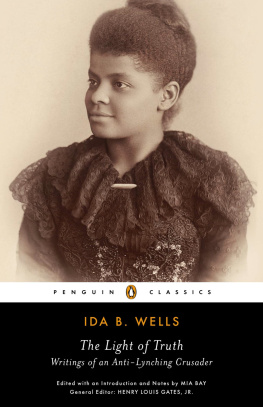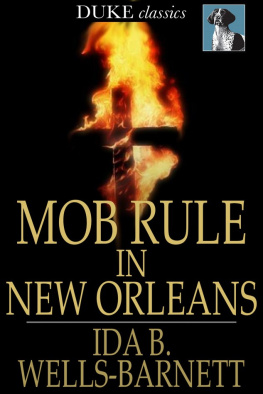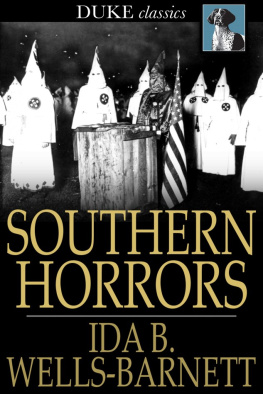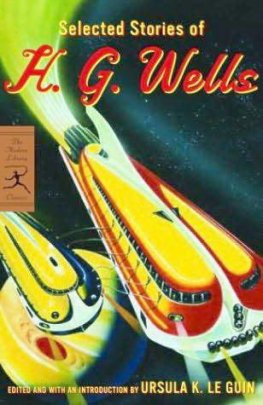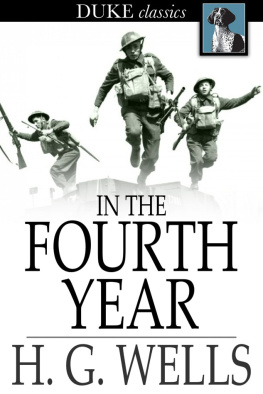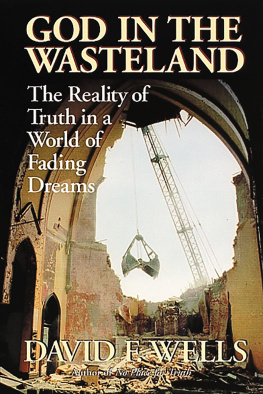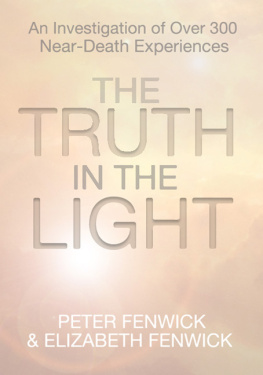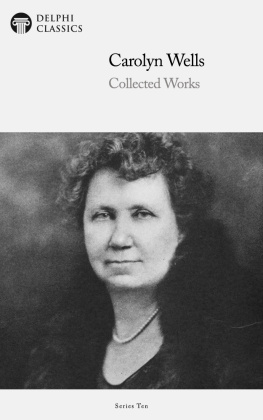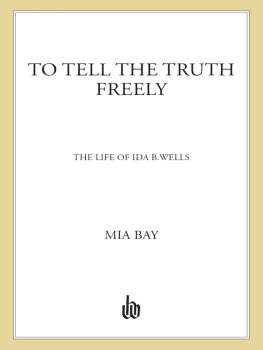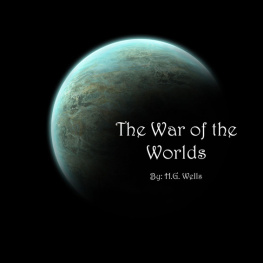Ida B. Wells - The Light of Truth
Here you can read online Ida B. Wells - The Light of Truth full text of the book (entire story) in english for free. Download pdf and epub, get meaning, cover and reviews about this ebook. year: 2014, publisher: Penguin Publishing Group, genre: Art. Description of the work, (preface) as well as reviews are available. Best literature library LitArk.com created for fans of good reading and offers a wide selection of genres:
Romance novel
Science fiction
Adventure
Detective
Science
History
Home and family
Prose
Art
Politics
Computer
Non-fiction
Religion
Business
Children
Humor
Choose a favorite category and find really read worthwhile books. Enjoy immersion in the world of imagination, feel the emotions of the characters or learn something new for yourself, make an fascinating discovery.
- Book:The Light of Truth
- Author:
- Publisher:Penguin Publishing Group
- Genre:
- Year:2014
- Rating:5 / 5
- Favourites:Add to favourites
- Your mark:
- 100
- 1
- 2
- 3
- 4
- 5
The Light of Truth: summary, description and annotation
We offer to read an annotation, description, summary or preface (depends on what the author of the book "The Light of Truth" wrote himself). If you haven't found the necessary information about the book — write in the comments, we will try to find it.
The Light of Truth — read online for free the complete book (whole text) full work
Below is the text of the book, divided by pages. System saving the place of the last page read, allows you to conveniently read the book "The Light of Truth" online for free, without having to search again every time where you left off. Put a bookmark, and you can go to the page where you finished reading at any time.
Font size:
Interval:
Bookmark:

PENGUIN  CLASSICS
CLASSICS
THE LIGHT OF TRUTH
IDA B. WELLS was born a slave in Holly Springs, Mississippi, in 1862. After beginning a teaching career to support her orphaned siblings, she moved to Memphis to become a journalist. There, she eschewed pressure to confine herself to writing womens interest pieces in favor of reporting on major social and political issues. In 1883, she was arrested for refusing to give up her seat on a train, an experience that she chronicled in her first published piece. Though Wells achieved success as a writer, editor, and even co-owner of a newspaper, her greatest accomplishments came after the lynching of a close friend in 1892 spurred her into a lifelong anti-lynching campaign. She published powerful diatribes against lynching, leading to death threats and forced exile in the North. In her work, she exposed and publicized the myths by which Southerners justified lynching. Wells devoted the rest of her life to civil rights, publishing widely and delivering impassioned speeches throughout the Northern states and Great Britain advocating for African Americans and womens rights. A cofounder of the NAACP, she continued to fight for social justice late into her life. Wells died in 1931 in Chicago.
MIA BAY is a professor of history at Rutgers University and director of the Rutgers Center for Race and Ethnicity. A 2010 Alphonse Fletcher Sr. Fellow and 2009 National Humanities Fellow, she is the author of two books on African American history and a biography of Ida B. Wells entitled To Tell the Truth Freely: The Life of Ida B. Wells.
HENRY LOUIS GATES JR. is the Alphonse Fletcher University Professor and founding director of the Hutchins Center for African and African American Research at Harvard University. He is editor in chief of the Oxford African American Studies Center and TheRoot.com, and creator of the highly praised PBS documentary The African Americans: Many Rivers to Cross. He is general editor for a Penguin Classics series of African American works.

PENGUIN BOOKS
Published by the Penguin Group
Penguin Group (USA) LLC
375 Hudson Street
New York, New York 10014

USA | Canada | UK | Ireland | Australia | New Zealand | India | South Africa | China
penguin.com
A Penguin Random House Company
First published in Penguin Books 2014
Introduction, notes and selection copyright 2014 by Mia Bay
General introduction copyright 2008 by Henry Louis Gates, Jr.
Penguin supports copyright. Copyright fuels creativity, encourages diverse voices, promotes free speech, and creates a vibrant culture. Thank you for buying an authorized edition of this book and for complying with copyright laws by not reproducing, scanning, or distributing any part of it in any form without permission. You are supporting writers and allowing Penguin to continue to publish books for every reader.
South Backs Down After Probe Looms (The Chicago Defender, June 25, 1927), Brand Ministers in Flood Area as Betrayers (The Chicago Defender, July 16, 1927 and Flood Refugees Are Held as Slaves in Mississippi Camp (The Chicago Defender, July 30, 1927) are reprinted by permission of The Chicago Defender.
eBook ISBN 978-0-698-14183-4
Version_1
THE LIGHT OF TRUTH
Liverpool Slave Traditions and Present
Practices (1894)
I have long nurtured a deep and abiding affection for the Penguin Classics, at least since I was an undergraduate at Yale. I used to imagine that my attraction for these booksgrouped together, as a set, in some independent bookstores when I was a student, and perhaps even in some todaystemmed from the fact that my first-grade classmates, for some reason that I cant recall, were required to dress as penguins in our annual all-school pageant, and perform a collective side-to-side motion that our misguided teacher thought she could choreograph into something meant to pass for a dance. Piedmont, West Virginia, in 1956, was a very long way from Penguin Nation, wherever that was supposed to be! But penguins we were determined to be, and we did our level best to avoid wounding each other with our orange-colored cardboard beaks while stomping out of rhythm in our matching orange, veined webbed feet. The whole scene was madness, one never to be repeated at the Davis Free School. But I never stopped loving penguins. And I have never stopped loving the very audacity of the idea of the Penguin Classics, an affordable, accessible library of the most important and compelling texts in the history of civilization, their black-and-white spines and covers and uniform type giving each text a comfortable, familiar feel, as if we have encountered it, or its cousins, before. I think of the Penguin Classics as the very best and most compelling in human thought, an Alexandrian library in paperback, enclosed in black and white.
I still gravitate to the Penguin Classics when killing time in an airport bookstore, deferring the slow torture of the security lines. Sometimes I even purchase two or three, fantasizing that I can speed-read one of the shorter titles, then make a dent in the longer one, vainly attempting to fill the holes in the liberal arts education that our degrees suggest we have, over the course of a plane ride! Mark Twain once quipped that a classic is something that everybody wants to have read and nobody wants to read, and perhaps that applies to my airport purchasing habits. For my generation, these titles in the Penguin Classics form the canonthe canon of the texts that a truly well-educated person should have read, and read carefully and closely, at least once. For years I rued the absence of texts by black authors in this series, and longed to be able to make even a small contribution to the diversification of this astonishingly universal list. I watched with great pleasure as titles by African American and African authors began to appear, some two dozen over the past several years. So when Elda Rotor approached me about editing a series of African American classics and collections for Penguins Portable Series, I eagerly accepted.
Thinking about the titles appropriate for inclusion in these series led me, inevitably, to think about what, for me, constitutes a classic. And thinking about this led me, in turn, to the wealth of reflections on what defines a work of literature or philosophy somehow speaking to the human condition beyond time and place, a work somehow endlessly compelling, generation upon generation, a work whose author we dont have to look like to identify with, to feel at one with, as we find ourselves transported through the magic of a textual time machine; a work that refracts the image of ourselves that we project onto it, regardless of our ethnicity, our gender, our time, our place. This is what centuries of scholars and writers have meant when they use the word classic, anddespite all that we know about the complex intersubjectivity of the production of meaning in the wondrous exchange between a reader and a textit remains true that classic texts, even in the most conventional, conservative sense of the word classic, do exist, and these books will continue to be read long after the generation the text reflects and defines, the generation of readers contemporary with the texts author, is dead and gone. Classic texts speak from their authors graves, in their names, in their voices. As Italo Calvino once remarked, A classic is a book that has never finished saying what it has to say.
Font size:
Interval:
Bookmark:
Similar books «The Light of Truth»
Look at similar books to The Light of Truth. We have selected literature similar in name and meaning in the hope of providing readers with more options to find new, interesting, not yet read works.
Discussion, reviews of the book The Light of Truth and just readers' own opinions. Leave your comments, write what you think about the work, its meaning or the main characters. Specify what exactly you liked and what you didn't like, and why you think so.

